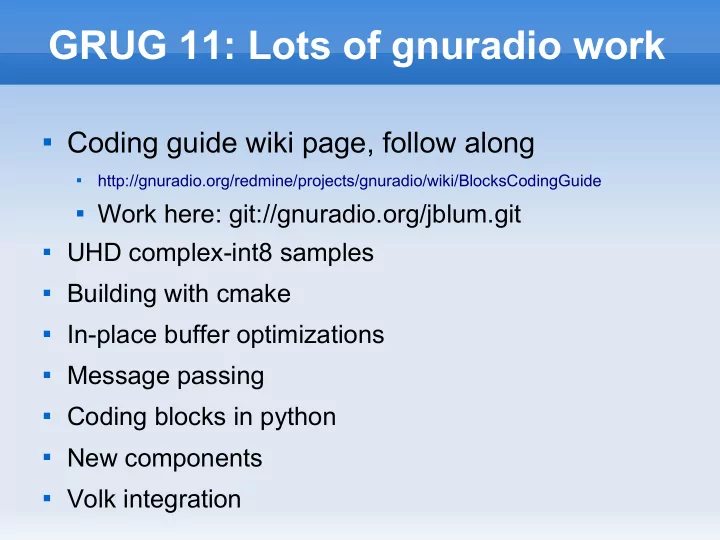

GRUG 11: Lots of gnuradio work Coding guide wiki page, follow along http://gnuradio.org/redmine/projects/gnuradio/wiki/BlocksCodingGuide Work here: git://gnuradio.org/jblum.git UHD complex-int8 samples Building with cmake In-place buffer optimizations Message passing Coding blocks in python New components Volk integration
UHD complex-int8 Doubles RX bandwidth at expense of dynamic range New UHD API to support alternative stream types Gr-uhd blocks support for new API Select host data type Select over-the-wire type GRC core changes Support all basic real and complex types Checks IO size not type Float32 → byte w/ vlen 4
UHD complex-int8 Doubles RX bandwidth at expense of dynamic range New UHD API to support alternative stream types Gr-uhd blocks support for new API Select host data type Select over-the-wire type GRC core changes Support all basic real and complex types Checks IO size not type Float32 → byte w/ vlen 4
Look at the colors!
UHD calibration stuff API for dc offset correction and iq imbalance Available in raw uhd API and gr-uhd python/c++ Self-calibration utils for SBX and WBX Sweeps LO across frequency Drags IQ imbalance and TX DC into noise Saves calibration table, auto loaded at runtime Find basic usage documentation here: http://files.ettus.com/uhd_docs/manual/html/calibration.html
Building gnuradio w/ cmake Build gnuradio with cmake Easier to express complex build rules Builds 100% out of tree No checked-in generated file Compilers/generators msvc, gcc Builds packages (debs, rpms, exes) More work for multi-deb, multi-rpm Instructions: http://gnuradio.org/redmine/projects/gnuradio/wiki/CMakeWork
In-place buffer optimizations Share gr-buffers (input memory = output memory) take advantage of caching Save precious memory bandwidth Share gr-buffers when certain rules apply Matching io size Fixed rate (sync block) Buffer has only one reader User set this->set_inplace(true, inport_index)
PMT Extentions PMT (polymorphic types) serializable, reference counted objects Used in stream tags Extensions to pmt blob RO and RW pointers Allocate + manage memory PMT Manager Memory re-use for pmt objects Backpressure for upstream consumers
Message Passing Pass message between blocks Messages are gr_tag_t (key, value, srcid) Implement mac layers, control planes Blocks have 1 input message queue Arbitray number of message destinations From the work function can pop incoming messages (upstream) Post to downstream subscriber group Scheduler has msg_connect(src, group, dst) http://gnuradio.org/redmine/projects/gnuradio/wiki/BlocksCodingGuide#Messages
Message passing cont... Some blocks that use the pmt blob type to pass bulk data Socket to/from blob (preserves packet domain) Stream to/from blob (stream to message domain) Framer/Deframer (gr-digital's pkt.py operates on blobs)
Some code for thought int work(...){ const gr_tag_t msg = this->pop_msg_queue(); //work stuff here... //perhaps the message determines what we produce... } int work(...){ //perhaps the input determines what messages we produce... pmt::pmt_t key = pmt::pmt_string_to_symbol("example_key"); pmt::pmt_t value = pmt::pmt_string_to_symbol("example_value"); this->post_msg("a message group", key, value); //work stuff here... } msg_src_block::sptr my_msg_src_block = msg_src_block::make(); msg_sink_block::sptr my_msg_sink_block = msg_sink_block::make(); gr_top_block_sptr tb = gr_make_top_block("some message flow graph"); tb->msg_connect(my_msg_src_block, "a message group", my_msg_sink_block); tb->start(); //the flow graph is now running...
New component gr-blocks Dumping ground for misc blocks (not core) Math operators, signal and noise source, delay block, stream selector Easy to add support for new data types Complex float ok, howabout complex int16? Avoid the gnuradio-core gengen paradigm Templated implementations Volk style naming convention SIMD optimized implementations also gr-filter
Using volk in a block Alignment issues Tail cases, buffer alignment set_output_multiple Whoops finte cases TODO set_input/output_alignment(...) See gr_blocks branch: gr-blocks/lib/add.cc Generic implementation for most types Implementation for floats calling volk Nick Foster should mention something... ORC etc...
Make gnuradio blocks in python Make real gnuradio blocks in python Overload work, general_work, start, stop... Numpy types for io signatures for work Stream tags and message passing too Removes need for old gr_msg_queues Philosophy Easier on user for rapid prototyping Optmize for performance if you need
C++ / python block comparison #include <gr_sync_block.h> from gnuradio import gr Import numpy class my_adder_block : public gr_sync_block{ public: class my_basic_adder_block(gr.sync_block): my_adder_block(...): def __init__(self, args): gr_sync_block( gr.sync_block.__init__( "another adder block", self, gr_make_io_signature(2, 2, 4), name="another_adder_block", gr_make_io_signature(1, 1, 4) in_sig=[numpy.float32, numpy.float32], ){} out_sig=[numpy.float32], ) int work( int noutput_items, def work(self, input_items, output_items): gr_vector_const_void_star &input_items, #buffer references gr_vector_void_star &output_items in0 = input_items[0] ){ in1 = input_items[1] //cast buffers out = output_items[0] const float* in0 = reinterpret_cast<const float *>(input_items[0]); const float* in1 = reinterpret_cast<const float *>(input_items[1]); #process data float* out = reinterpret_cast<float *>(output_items[0]); out[:] = in0 + in1 //process data #return produced for (size_t i = 0; i < noutput_items; i++) return len(out) out[i] = in0[i] + in1[i]; //return produced return noutput_items; } };
Recommend
More recommend